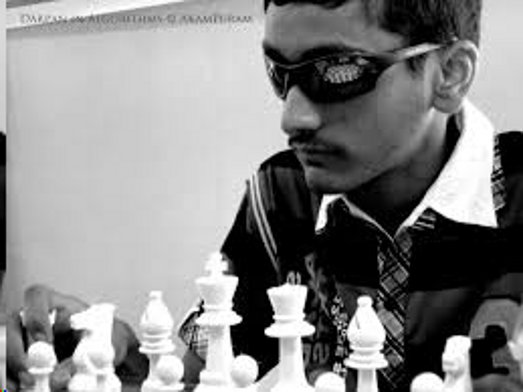New Documentary Follows the Life of Blind Chess Players in India

Algorithms, a documentary by Ian McDonald, takes a look at the relatively unknown world of blind chess players. Filmed over the course of four years, the documentary follows three talented children--Darpan, Sai Krishna and Anant—and one former champion player—Charudatta Jadhav—as they compete in chess tournaments and try to bring a champion title to India.
The documentary opens in Mumbai at the National Team and Junior Blind Chess Championship in 2009, showing partially-blind and totally-blind people competing against each other. Blind chess players, as it is shown, play using a special pegged board, allowing them to pick up and move pieces. With the pegged pieces in place, the players feel across the board which helps them to understand and mentally visual the layout of the game-in-progress.
“Chess is a mind game. Chess is the only game where a blind player can play at par with sighted,” says Charudatta Jadhav, Vice President of the International Braille Chess Association (IBCA), and General Secretary of All India Chess Federation for the Blind (AICFB). “If the infrastructure is provided to the blind, then he can surpass his sighted counterpart.”
The first scene culminates when Darpan loses a match to Sai Krishna; the younger boy moves on to compete in the Junior World Championship in Sweden. The documentary follows this pattern, alternating between the boys playing chess at home and advancing to play in tournaments in Greece, Serbia and other European countries. As is the style of documentaries, we are given at-home glances of these upcoming chess players and how they manage their daily lives being partially and totally-blind.

The other important figure in Algorithms is Charudatta Jadhav. His involvement in the IBCA and AICFB is considerable, and he also counsels and trains the boys during chess season. Jadhav is the driving force behind these players in competition and is also a father figure to them as well. He helps push them to succeed, but also teaches them valuable life lessons.
Algorithms succeeds in bringing the viewer on an interesting journey through the world of blind chess, although the documentary is not without its faults. For one, there is not enough information presented throughout the film in regards to the development of blind chess leagues and tournaments. While we see the boys studying and playing chess, there’s very little insight as to how they are taught. With a title such as Algorithms, there is no further explanation as to how the game is played or won—it is merely hinted at that there are strategies and patterns at play. The film is also shot in black and white—which can be viewed as a stylistic and metaphorical choice—but it loses its credibility when, in one scene, Jadhav expresses his disappointment that he cannot see the natural beauty of Greece.
There are emotional moments in Algorithms as well, but these are mostly quick and fleeting—the focus is more on the overall journey of the Indian blind chess players. What the film does succeed at is inspiring hope, a hope that all players can be viewed as equal in the eyes of the game.
Author Bio:
Gabriella Tutino is a contributing writer at Highbrow Magazine.




























































































































































































































































































































